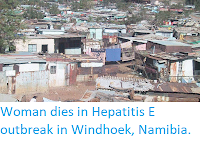Eleven people have been confirmed dead and a further fourteen have been confirmed to be infected in an outbreak of Nipah Virus in Kerala State, India, with a further twenty two patients in Kerala and two in neighbouring Karnataka State, The first case was reported in Kozhikode District, Kerala, on Saturday 19 May 2018, since when the disease has spread to Malappuram, Wayanad and Kannur districts in Kerala, and possibly Mangalore in Karnataka State. Not all of the identities of the victims have been released, but four are understood to be members of the same family, while one was a nurse who contracted the Virus while treating the first reported victims at the Perambra Taluk Hospital in Kozhikode.
Nurse Lini Puthussery, 28, a nurse at the Perambra Taluk Hospital in Kozhikode, who died on Monday 21 May 2018 after contracting Nipah Virus from patients she was treating. Deepu Sebin/Twitter.
Nipah Virus is a single-strand RNA Virus in the Family Paramyxoviridae, which also includes the Viruses that cause diseases such as Mumps and Rhinderpest. It is a zoonotic disease (disease with an animal host that sometimes infects Humans), that naturally infects Fruit Bats, but which can infect Humans and domestic animals. Like many zoonotic diseases, Nipah Virus is particularly lethal when infecting Humans, as Humans are not part
of their natural life-cycle, with the effect that they are not under
evolutionary pressure to keep Human hosts alive in order to perpetuate
themselves. Such diseases typically have short duration and a high
fatality rate, though epidemics usually burn out quickly.
Nipah Virus infections generally first manifest as a fever, accompanied by headaches, drowsiness and disorientation. This can progress rapidly to encephalitis (inflammation of the brain), which results into patients falling into a coma and dying, often within 48 hours of the initial infection. In some patients the disease also infects the respiratory tract, resulting in breathing problems, and a much higher likelihood of passing on the infection.
See also...
Follow Sciency Thoughts on Facebook.







